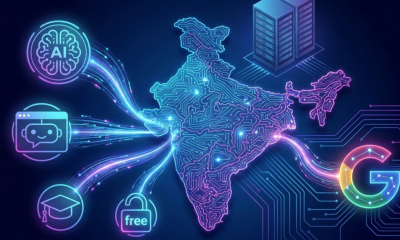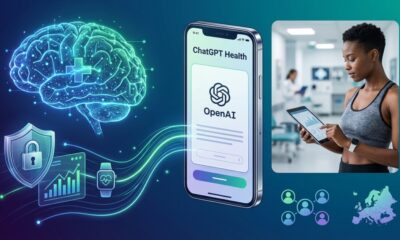Thought Leaders
People Fear AI, But Apple’s ChatGPT Could Make AI Everybody’s Friend

There were MP3 players before, but they were nothing like the iPod. There were touch smartphones before, but they were nothing like the iPhone. And there were Large Language Model-based AI-based chatbots before – but if history is any guide, Apple’s upcoming intelligent chatbot will be nothing like the ones already in use, providing a portal into a fully immersive AI experience that will follow the formula that made Apple the success it is today – technology that “just works.”
The report by Bloomberg that Apple was getting ready to unveil its chat system – currently known as Ajax – comes as no surprise. Apple has been readying its AI strategy for years – it’s far ahead of any other major tech firm in AI acquisitions and investments – but it’s been curiously silent as competitors Google (Bard) and Microsoft (ChatGPT) released their AI-based chatbots. That apparently has changed, and it’s likely just a matter of time before Apple releases its own intelligent chatbot.
Of course, no one (other than Apple CEO Tim Cook and selected Apple bigwigs) really knows what the company is planning. But based on past experience – and the revolution Apple has brought to existing industries and developing the iconic products that have changed the world – the company’s chatbot could be expected to do the same. The Apple difference is likely to be the same difference the company brought to MP3 players, smartphones, computers, earbuds, networking equipment, and more – ease of contextual use.
Just as that ease of contextual use paved the way for widespread adoption of smartphones (whether in the form of iPhones or competing similar-looking and acting Android devices), an Apple AI-based chatbot will pave the way for widespread adoption of AI chat systems, and other AI systems. Right now, many people fear AI, but Apple’s user-friendly and uber-useful chatbots may help them feel more comfortable with the idea of using the technology in their daily interactions – and when that happens, the AI revolution will really take off.
Integration is a gamechanger
The secret to Apple’s chatbot – and its foray into AI – is integration with a data, application, and device infrastructure. That integration has been Apple’s specialty ever since it came out with iPod and its accompanying iTunes app. With that combination, for example, Apple simplified the streaming experience. Before iTunes, downloading music to an MP3 player required a slew of applications and websites; with the iPod, browsing and downloading music became a matter of pressing a button, Apple’s chatbot and its upcoming AI products will work the same way – and the services available will be contextualized for each device and purpose.
Just as Siri operates contextually within the Apple device universe, so will Apple’s AI services. And just as Apple services draw on data gathered from user preferences, device experiences, health information (collected by the Apple Watch) to provide precise, contextualized answers and experiences, so will Apple’s chat system utilize data to contextualize responses, with the addition of AI analysis, machine learning, and other advanced technologies.
Thus, a user asking Apple’s chatbot for detailed workout guidance via their Apple Watch will get information on how to use the watch’s built-in exercise functions – the best way to take strides when running or jogging, how to pace yourself on an indoor bike for maximum cardio effectiveness, etc. But when a high school student writing an essay on the benefits of exercise on their Macbook asks the same question, they may get a different answer – one that cites academic references, medical implications of exercise, etc. By taking into account the device, user, and context, Apple’s chatbot could provide very relevant information that will provide the answers users are really looking for – as opposed to the detailed, but generic answers provided by current iterations of AI-based chatbots.
Data that is useful —and protected
On the iPhone, meanwhile, app developers will likely be able to utilize an API that will enable them to integrate the intelligent chatbot’s services. A commuter using an app to figure out how to get from their home to a destination might be given directions contextualized to their age or physical situation – someone with a heart condition, for example, may be given information on the cheapest taxi services from the bus stop they need to get off at, as opposed to a young athlete, who might be given walking directions to the final destination from that same bus stop. And the personalized data utilized for the service will likely be as well-protected as the data users upload to Apple’s iCloud storage service. In other words, if you trust iCloud with your photos, you should be able to trust Apple’s chatbot with your health data.
Tim Cook himself confirmed Apple’s integrative, contextual, and security approach to AI in a recent interview. Speaking on Good Morning America, Cook said that while he shies away from using the term AI, “We do integrate it into our products,” whatever the technology was called. Cook also said that “guardrails were needed” to ensure that AI is used responsibly – bringing to mind Apple’s “closed garden” App Store policies, where apps need to be approved before being listed.
And the Verge listed a series of contextual (device and data) AI integrations announced at the Apple’s annual WWDC tech event that the company is working on, including “better autocorrect” for iPhones and iPads, “a personalized volume feature for AirPods that ‘uses machine learning to understand environmental conditions and listening preferences,’” “an improved Smart Stack on watchOS that ‘uses machine learning to show you relevant information right when you need it,’” “on-device machine learning” for Apple’s new journaling app (called Journal), and more.
Technical integration will pave the way for life integration
Once people get used to the Apple Way in chatbots – with chat services fully integrated into their user experiences – we can expect more AI to be integrated into our daily lives. The ease of use – and the contextual relevance – that Apple’s system is likely to bring could also help take the edge off society’s AI fears; instead of seeing AI as an “other” to be feared, users will get used to its functionality – and come to realize that, like cars and banks, AI can provide valuable services if it is used and regulated properly (Cook himself said in the GMA interview that AI needed regulation).
We have seen a similar trajectory with apps and APIs and the cloud in general— for example, in my field, consumers moved to digital financial services when they were easy to use and always available. The same is true as AI plays a growing role in digital life; we see that consumers use it and benefit from it when it is easily available as part of the apps or platforms they are already using. AI no doubt offers insights humans cannot get on their own; but the user experiences must be seamless for us to truly benefit.
A good example would be an app that generates automated product investment suggestions based on an individual’s financial and life situation. The app would provide suggested investments based, for example, on risk tolerance – helping those near retirement to steer clear of investments that could jeopardize savings built over many years. The AI behind this would be woven into the app, without requiring that the user input special commands or information.
Leave it to Apple to Make AI Everybody’s Friend
How likely is all this to come about? We won’t really know Apple’s strategy until the company officially unveils it – or at least unveils the integrations and services it plans to provide with its intelligent chatbot. But there’s no doubt that Apple’s foray into AI will fundamentally change the way we see – and use – that technology.
For various reasons (most likely because of its ubiquity on Amazon’s Echo devices) Alexa is the best-known and most popular voice assistant technology – but even in that sphere, Apple was first, releasing its Siri voice assistant in 2011 – predating Google Now (2012), Cortana (2013), and Alexa (2014). Siri was a rare “failure” for Apple, falling behind its newborn rivals in usability, functionality, and market share. But you can be sure that when it comes to the conversational AI market (soon-to-be worth some $30 billion), the company will be pulling out all the stops to ensure success – and for Apple, that means integrating technology into the devices, apps, and services people use on a daily basis.












